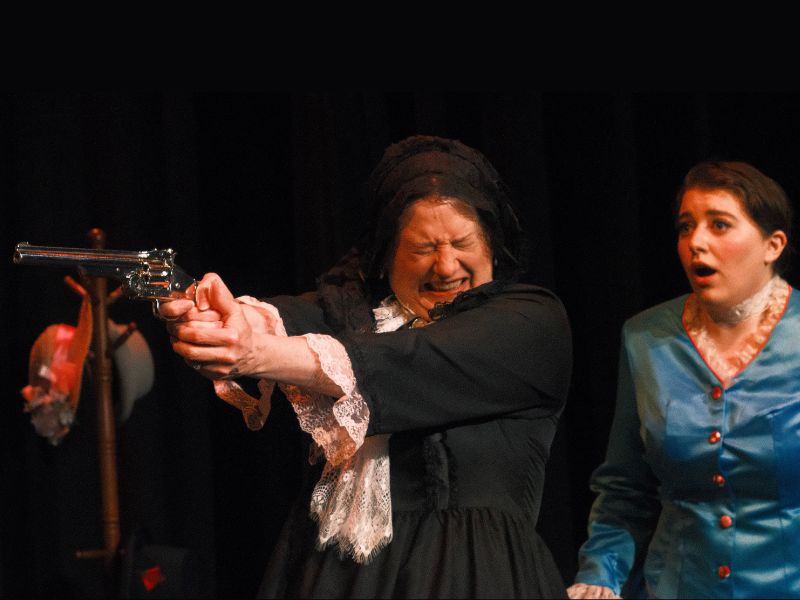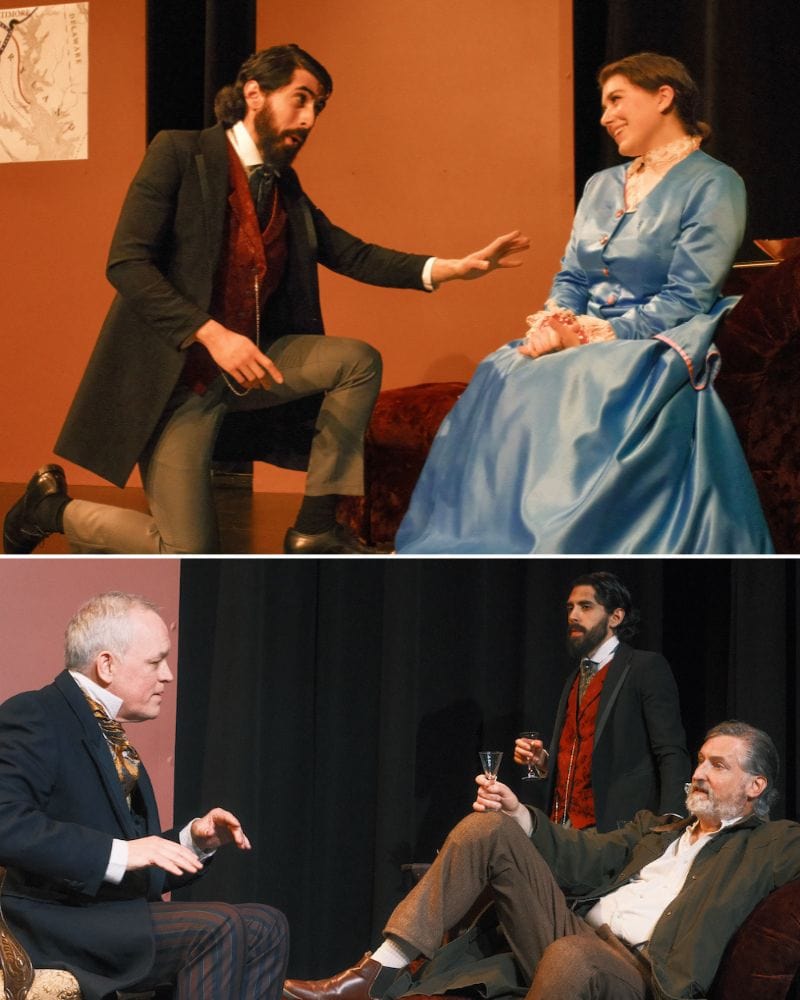Civilizing Lusby by the Best Medicine Rep Theater Company is easily worthy of the Kennedy Center. This play written by John Morogiello and directed by Kathleen Barth somehow makes existing tropes new. Almost immediately into the performance, you realize this is no just-fine play with well-meaning but not excellent performances: this is a tour-de-force of performance and playwriting, aided by Morogiello’s casting as the mononymous protagonist Preston. Civilizing Lusby at the Writer’s Center is the best theatrical performance I’ve seen in a long time.
The writing of this show, billed as “a tragedy with jokes,” utterly shines. Morogiello fluently writes in language that sounds matched to the appropriate historical and geographic vernacular, at least to my rookie ear. The show centers on Preston, former surveyor-turned-impoverished-waterman once mistaken for a Confederate soldier by Union soldiers who branded his face with a “D” for deserter. Immigrant-turned-ruthless capitalist and railroad contractor Declan Lyons (J. McAndrew Breen) and insecure banker’s son Mr. Goldsborough (Matthew Marcus) seek to take Preston’s home and land to build a train through it and milk the nearby town for economic value — think Hitchhiker’s Guide.

Meanwhile, Lyons’ gender-traditionalist wife Mary (Rebecca A. Herron) is bent on both shielding and marrying off her rash daughter Kate (Josie Morgan), who seeks adventure and defiance of convention for romanticism’s sake. But Kate learns through pain and her same rash courage some tough lessons that add nuance to her idealist worldview. Indeed, Lusby’s characters appear at first to occupy familiar archetypes, but as the story unravels we see how they relate to archetypes of today — and find ways we can simultaneously find fault and empathize with each other. Each character, even those with the most moral high ground to boast, thinks they’re right and condemns others while remaining willing to defend their own desires at others’ expense. Characters who appear reasonable or shallow don’t merely learn what’s right later, but demonstrate what about their static traits is worth taking another gander at; we learn about the characters not through the way that they change, but by what they are put up against, which makes the script even more equipped to comment on the unchanging polarized characters of our political era.
Perhaps this is what they mean when they talk about showing-not-telling and three-dimensional characters. And thanks to this, this political script is actually saying something new about cultural archetypes in the Trump and post-Trump era — hallelujah.
And the performances of these characters generally live up to their writing’s excellence: Morogiello’s Preston’s roguish charm consistently serves to convince us that he trusts his own street smarts and morality to worry about his own wrongdoing or death. McAndrew Breen’s Lyons’ delivery makes us truly believe that maybe a human being could care more about his wife’s disfigurement making him feel bad than her suffering. Kate’s youthful naivete and feminine wiles are emphasized to a borderline-irritating degree, but their intensity makes her evolution into maturity all the more affecting.
While avoiding spoilers, each other character proves to not be what they seem as well: we see Declan using his wealth and power to essentially colonize a poor man’s land in the name of taking what he deserves as an immigrant who pulled up his bootstraps. Mary Lyons feels that women have to lean into traditional tropes about female subservience to economically survive and maintain a shred of social power, but she restrains and verbally belittles her daughter in pursuit of the idea. Preston clearly opposes the imperialist, selfish tendencies of Lyons and Goldsborough but is willing to kill and destroy for his own needs. Oh, and all the male characters’ verbal treatment of Kate not only comes from antiquated ideas about women’s emotional strength but also genuinely seeks — out of honest concern for her well-being — to protect her from violence that her aristocratic upbringing has not prepared her for. The nuance of this script and its entertaining and insightful “timeliness” is wildly refreshing. This same nuance also makes the show unpredictable — another breath of fresh air.

Almost all of the very few issues with this production come down to minor aspects of the writing: Morogiello occasionally takes liberties with modern colloquialisms and phrasing, usually for the sake of humor: for example, in one comedic moment having Preston say “the only thing that stops a good guy with a gun is a bad guy with a gun” — but the archetypes these characters occupy are so directly connected to archetypes existing in today’s political landscape that anachronisms are not entirely inappropriate. The writing sometimes tries to explain the play to the cast when it is more than good enough to stand on its own — for example, in one scene Goldsborough says, “I’m not bad, sir, I am the progress of American business,” and Preston says, “And I’m the rugged individual, the rebel, defender of his rights and honor. Me and you are both doing bad things for good reasons.” But lines like this comprise only about 5 percent of the show.
Other minor issues include the diction of some characters: while J. McAndrew Breen and Rebecca A. Herron seem to have natural Irish accents that ideally couch their characters in reality and Morogiello easily delivers on Preston’s Southern drawl, Morgan does not have the clearest vocal goal. Her accent is a Southern-ish, modern-ish, Irish-ish blend. Marcus’ voice for the banker’s son Marcus is also not the most immersive — he could also deliver his lines with greater fluidity at times, but his performance is believable in Act II as the unfolding tension forces the pace of dialogue to quicken. Morgan and Marcus’ accents are not the most helpful toward the suspension of disbelief, but they primarily stick out due to the sheer excellence of not only the three other actors’ accents but also their vocal performances.
Civilizing Lusby is a phenomenal work of playwriting and production that raises the standard for small professional theater. This show is worthwhile viewing for anyone who’s been alive the last few years. After a few writing edits, I hope it goes to Broadway.
Running Time: Approximately two hours with one 10-minute intermission.
Civilizing Lusby plays through April 21, 2024 (performances on Friday and Saturday at 7:30 PM; matinees on Saturday and Sunday at 2:30 PM), presented by Best Medicine Rep Theater Company performing at The Writer’s Center, 4508 Walsh St, Bethesda, MD. All tickets are pay-what-you-can online or at the door.
COVID Safety: Masks optional.
Civilizing Lusby
A tragedy with jokes by John Morogiello
Directed by Kathleen Barth




